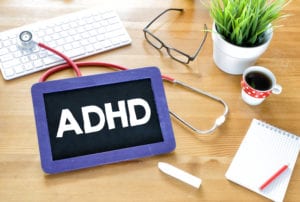Written by Joyce Smith, BS. Exposure to maternal hypothyroidism prior to or during pregnancy significantly increases the risk of Attention-Deficit Hyperactivity Disorder (ADHD) in offspring.
 ADHD is one of the most common neurodevelopmental disorders of childhood. It is characterized by an ongoing pattern of inattention and/or hyperactivity-impulsivity that interferes with functioning or development and affects 9.4% of children 2-17 years of age 1. It often leads to lifelong problems of substance abuse, risky behaviors, and poor academic performance, costing tax payers 143-262 billion dollars in healthcare and maintenance costs 2. Thyroid hormones regulate many of the genes implicated in childhood ADHD. While researchers have explored a possible association between thyroid dysfunction and ADHD, results have been inconclusive and conflicting 3.
ADHD is one of the most common neurodevelopmental disorders of childhood. It is characterized by an ongoing pattern of inattention and/or hyperactivity-impulsivity that interferes with functioning or development and affects 9.4% of children 2-17 years of age 1. It often leads to lifelong problems of substance abuse, risky behaviors, and poor academic performance, costing tax payers 143-262 billion dollars in healthcare and maintenance costs 2. Thyroid hormones regulate many of the genes implicated in childhood ADHD. While researchers have explored a possible association between thyroid dysfunction and ADHD, results have been inconclusive and conflicting 3.
To further investigate a potential association between children born to mothers with or without hypothyroidism, researchers 4 followed 329,157 children who were hospital born in a large diverse Southern California population in Kaiser Permanente Southern California. A follow-up continued through childhood until either an ADHD diagnosis was achieved, the child reached 18 years of age, a non-ADHD-related death occurred, or the study was completed in December of 2016. Unlike previous European research that included ethnically homogenous populations, which did not allow for generalizability to other ethnic groups, this American study included people of diverse ethnic backgrounds and, furthermore, observed the children for nearly two decades to better detect those with ADHD and to monitor them as they aged and progressed through school. The team analyzed children’s medical records and collected key information that could be potential confounders such as the sex and age of the child, the mother’s age during pregnancy, race-ethnicity, median household income, education, prenatal care, smoking habits during pregnancy and gestational age at delivery.
Data analysis revealed that the risk of ADHD in children was increased when hypothyroidism was diagnosed prior to or during pregnancy and was greatest when hypothyroidism diagnoses occurred during the first trimester of pregnancy. The association was strongest for preterm born infants and stronger for boys than for girls and Hispanic children compared to other race ethnicities.
Study limitations include the difficulty in diagnosing and treating ADHD in minority children which may have been a potential bias. Although potential confounding factors were considered in the analysis, unaccounted for residual factors still remained. In addition, the study excluded premature infants born before 28 weeks gestation. It was also not known what caused the maternal hypothyroidism and whether it preceded the development of ADHD. Further studies are needed to determine whether fetal hypothyroidism occurs in the absence of maternal hypothyroidism and how thyroid hormone deficiencies affect the fetal brain to cause ADHD. Although the mechanism remains to be elucidated, the study clearly demonstrates that maternal hypothyroidism during the preconception period and first trimester significantly increases the risk of ADHD in children.
Source: Peltier, Morgan R., Michael J. Fassett, Vicki Y. Chiu, and Darios Getahun. “Maternal Hypothyroidism Increases the Risk of Attention-Deficit Hyperactivity Disorder in the Offspring.” American Journal of Perinatology (2020).
© Thieme Medical Publishers Inc.
Posted November 17, 2020.
Joyce Smith, BS, is a degreed laboratory technologist. She received her bachelor of arts with a major in Chemistry and a minor in Biology from the University of Saskatchewan and her internship through the University of Saskatchewan College of Medicine and the Royal University Hospital in Saskatoon, Saskatchewan. She currently resides in Bloomingdale, IL.
References:
- Mahone EM, Denckla MB. Attention-Deficit/Hyperactivity Disorder: A Historical Neuropsychological Perspective. Journal of the International Neuropsychological Society : JINS. 2017;23(9-10):916-929.
- Doshi JA, Hodgkins P, Kahle J, et al. Economic impact of childhood and adult attention-deficit/hyperactivity disorder in the United States. Journal of the American Academy of Child and Adolescent Psychiatry. 2012;51(10):990-1002.e1002.
- Päkkilä F, Männistö T, Pouta A, et al. The impact of gestational thyroid hormone concentrations on ADHD symptoms of the child. The Journal of clinical endocrinology and metabolism. 2014;99(1):E1-8.
- Peltier MR, Fassett MJ, Chiu VY, Getahun D. Maternal Hypothyroidism Increases the Risk of Attention-Deficit Hyperactivity Disorder in the Offspring. American journal of perinatology. 2020.
